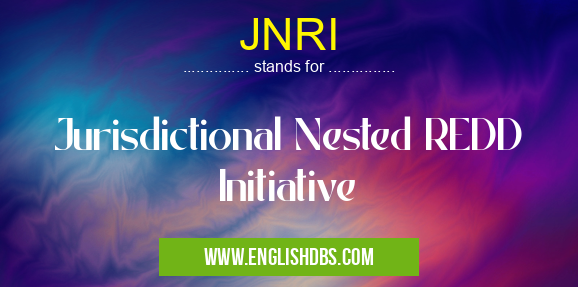What does JNRI mean in UNCLASSIFIED
The Jurisdictional Nested REDD Initiative (JNRI) is an international cooperative agreement between parties from different countries to reduce emissions from deforestation and forest degradation. It is intended to provide an alternative development pathway that focuses on reducing emissions from deforestation and forest degradation as a contribution to global climate mitigation efforts.

JNRI meaning in Unclassified in Miscellaneous
JNRI mostly used in an acronym Unclassified in Category Miscellaneous that means Jurisdictional Nested REDD Initiative
Shorthand: JNRI,
Full Form: Jurisdictional Nested REDD Initiative
For more information of "Jurisdictional Nested REDD Initiative", see the section below.
Essential Questions and Answers on Jurisdictional Nested REDD Initiative in "MISCELLANEOUS»UNFILED"
What does JNRI mean?
JNRI stands for Jurisdictional Nested REDD Initiative. It is an international cooperative agreement between parties from different countries to reduce emissions from deforestation and forest degradation.
What is the purpose of JNRI?
The purpose of the JNRI is to provide an alternative development pathway that focuses on reducing emissions from deforestation and forest degradation as a contribution to global climate mitigation efforts.
Who are the main stakeholders in JNRI?
The main stakeholders in the JNRI are governments, private sector companies, civil society organizations, local communities or indigenous people, and other entities involved in activities such as research, conservation, or monitoring related to forests or ecosystems services at a jurisdictional level.
What kinds of actions are supported by JNRI?
The actions supported by the JNRI include activities such as improved governance for forests, developing socio-economic systems that are better aligned with sustainable land use practices, conserving biodiversity, creating incentives for sustainable forestry management, promoting community participation in decision-making and management of forests, strengthening local capacity for monitoring and research, improving access to knowledge resources and technical expertise, providing technical support and advice on reporting requirements under the UNFCCC etc.
How does JNRI help combat climate change?
By ensuring that practices within each jurisdiction focus on reducing emissions from deforestation and forest degradation as a contribution to global climate mitigation efforts. This ultimately helps mitigate against climate change by preventing additional carbon dioxide entering the atmosphere through unsustainable land use practices.
Final Words:
The Jurisdictional Nested REDD Initiative provides an effective way for governments around the world to collaborate and take action towards reducing emissions from deforestation and forest degradation. Through its support towards encouraging sustainable forestry management practices at a jurisdictional level it can make a significant contribution towards helping mitigate against climate change.
